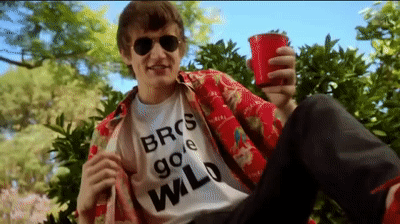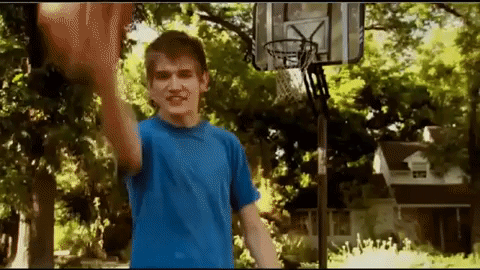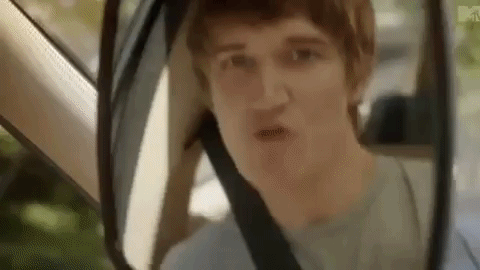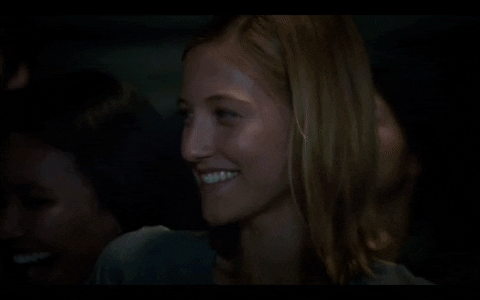How Burnham’s Move to Television Resulted in the Most Underrated Show of the Decade

“I think of it as a documentary about heroin addiction made by a heroin addict who’s addicted to heroin at the time.” — Bo Burnham on Zach Stone is Gonna Be Famous
It begins in a bedroom, much like the one we saw a few years ago. But something’s different. It looks more professional, the video quality’s certainly a step up. It looks like someone hired a camera crew. Someone did, that young boy, now a little older, lies in his bed. He pretends to sleep and makes a big show of waking up. From the moment he wakes up, he is performing for the camera. He looks at it, smiling. He’s about to start a new chapter of his life. One that he hopes works because if it doesn’t, he doesn’t know what he’ll do.
Bo Burnham hit the comedy scene in a big way and it wasn’t long before Hollywood came calling. In 2010 Burnham got a development deal from MTV, one of the most formative and popular channels for Millenials, to work on a new television series. After reading a poll stating that 40% of graduating high school seniors wanted to be famous over more practical occupations like medicine or education, the gears in Burnham’s head started turning. Burnham saw the vanity in his generation and decided to explore that through a sometimes broad, but grounded satire of Millennials on the same network that helped foster that desire for fame.

Zach Stone is Gonna Be Famous follows Zach Stone (Burnham), a teenager fresh out of high school. Rather than think about college or his academic future, he spends his entire life savings on a camera crew to follow him around and record his various attempts at becoming famous. From creating five second songs to fast track becoming a famous musician to staging a Bachelor rip-off called “The Zachelor,” Zach fumbles at every turn and while avoiding the hard truths of his future. His friends Greg (Armen Weitzman) and Amy (Caitlin Gerard) are going to college and Zach has no other plan if this quest for fame does not end in success.
The premise is rife for comedic opportunity and Burnham takes it to its extremes. The episodes are often cringe-inducing and always hilarious, but also filled with a lot of heart. Burnham wanted to create a character that was “likable in spite of his face,” and even though he could be “abrasive and annoying,” Zach Stone is not the bad guy, but rather “fame is the enemy.” Fame can bring out the worst in people and Zach Stone is Gonna Be Famous uses its lead character to take his generation’s obsession with instant success and popularity to extremes that border on ludicrous and unhealthy.

Zach’s plan to become famous shows a break from reality. He represents the traits often attributed to his generation at its worst. He’s vain, selfish, and ignorant. He constantly cajoles his friends and family with helping him in all his crazy schemes, with almost detrimental results. His father Drew (played by Biff Tannen himself, Thomas F. Wilson) rails against it while his mother Sydney (Kari Andrews) supports him even though his behavior concerns them both.
Zach is looking to reinvent himself, but by taking shortcuts instead of doing the actual work. In the Pilot, his father notes that he stopped playing piano because the stool was too uncomfortable. Zach brushes off the fact that he doesn’t need a skill to be a success noting “Soulja Boy, super famous and he can’t even read.” He tries to build his brand by looking for sponsors for the show (“Levis: The jeans of our fathers,” is one he tries) as a way of rocketing himself to the top. Zach is quick to do what many in his generation are doing by “giving up their originality to be branded.” For Zach, becoming famous is a cinch, all it takes is anticipating what’s popular and exploiting it to its fullest potential.

Zach’s decision to hire a camera crew is a clear reaction to the fact that his friends are all moving on with their lives without him. Greg and Amy are off to college while he was put on the wait list at his dream school. For Zach, becoming famous is his only way out of the rut that is his upbringing. “If I don’t get famous, I’m going to be working in a coal mine,” he says to Amy in the Pilot. As absurd as that statement is, it’s spoken out of true fear. He’s terrified of being forgotten, of being the nobody that many other kids in his town think he is. He initially saw school as a means to get out and reach his full potential. But when that didn’t pan out, he panicked and went down a riskier path. When he has the chance to correct that mistake and go to his dream school, he forgoes it, deciding to stick to his own methods. Every attempt is Zach fighting for his life and he keeps tripping over his own feet. As he keeps failing, he grows more desperate.
Burnham created Zach Stone to explore “what if the subject was in control [of the cameras] instead of the victim?” Of course, Zach is constantly battling for control of his own narrative, but reality gets in the way. His bold claims are often contradicted by the people around him (In the Pilot Zach claims, “My parents are beyond supportive,” and his father immediately retorts, “This is the dumbest thing you’ve ever done.”) which makes Zach more and more frustrated. At one point he recasts his own brother Andy (Cameron Palatas) when Andy says that he is embarrassed to have Zach as his brother. Zach feeds into a society of polarization where we “wait to change things to suit our sense of how things ought to be” instead of how they really are. Zach’s fears of the truth cause him to constantly rewrite reality, but reality will not let him get away with it. This is shown to us from the jump in the opening credits:

Zach’s cloud of ignorance expands to his friends as well. He treats the two people closest to him, Amy and Greg, almost as if they’re props when the cameras are on. At first he tries to protect Amy from the cameras saying “You should be unedited,” but gradually Amy gets sucked into Zach’s orbit when he realizes that he has feelings for her and vice versa. Greg and Amy attempt to have serious conversations with Zach about the future, but Zach dismisses them throughout. There are moments when Zach appears to have learned from his bad behavior, but then something else comes along and he presses on to the next zany scheme.
Zach’s continuous endeavors range from silly to downright dangerous. In “Zach Stone is Gonna Be A Hero” he stages a faux rescue of Greg, but almost drowns them both in the process. His idea of fame comes from the culture he was raised in that rewards that kind of behavior. “The net celebrates kids whose antics are at the most sensationalist and, as a result, often reckless and self-destructive.” Zach’s efforts are intrusive and sometimes barely avoid complete disaster. This is exemplified in this moment in the opening credits of “Zach Stone is Gonna Get A Makeover.”

Here, Burnham once again boils down the entire show to a single image : A young man so obsessed with himself that he is oblivious to the harm he could cause himself and others.
Zach gets away with this because he knows that the people who care about him will forgive him no matter what he does. In “Zach Stone is Gonna Be the Zachelor” Zach ruins his parent’s anniversary dinner and they banish him to his room. Zach reconciles this later by setting up candles, roses, and ice cream for his parents so they can enjoy their anniversary. His parents are touched by this display and ask Zach to join them. Zach demurely rejects the offer, but they insist. Zach sits down and pulls out a third bowl, implying that he knew they would forgive him and ask him to join them. This demonstrates Zach’s exploitation of his friend’s and family’s love to further enable his quest for fame.
Despite Zach’s bravura that he puts on for the cameras, there are constantly moments where Zach’s insecurities and fears come forth. In “Zach Stone is Gonna Get A Makeover” Zach gets invited to a party where all the popular kids, that he was never one of, will be. Zach sees this as an opportunity to “show them the new me,” instead of “the stupid kid with the monogrammed mug in the hallway.” Zach hopes that the cameras will be a one-step solution to gaining the respect and acceptance from the people that he’s yearned to be. “You have to constantly be reinventing yourself in order to please everybody,” he concludes. However, he fails to register the acceptance he’s got from the people around him and have always cared: his friends and his family.
Zach learns that the party is a pool party and thus he will have to be shirtless. He takes his shirt off and looks at his body with disappointment. Like many people in his generation, Zach feels “the pressure to achieve physical, sexual, and social perfection.” Zach grapples with the unrealistic beauty standards his generation is subjected to and when he cannot get “Lautner’s pecs, McConaughey’s abs, Serena’s calves (not Venus’s),” he looks at quick fixes like tanning, getting an insane haircut (“Your hair looks scared” his little brother quips), and drawing on abs. As a result, he looks unnatural, ridiculous, and reeks of desperation.
At the party, Zach’s attempts to appear cool and changed backfire as his peers see right through him. Zach doubles down, jumping into the pool and exclaiming “I’m living my dream!” before faceplanting in, washing away the abs and spray tan. This faceplanting is both physical and metaphorical. Zach keeps trying to save face, to prove that he’s not the loser weirdo that everyone thought he was. When he’s challenged, he goes further. But that jump in the pool strips him of all that artifice. That despite everything on the outside, he is still the outcast that everyone perceived him to be. He derails the party and any respect anyone might have had for him washes away.

One of Zach’s earliest attempts to gain notoriety is to charm and date Christy Ackerman (Shelly Hennig), the hottest girl in his school. When he asks her out, she doesn’t recognize him. It is when she sees the cameras that her demeanor changes completely. This leads to a brief period where Christy pretends to like Zach for the sake of her own self interest. It all implodes in “Zach Stone is Gonna Make a Sex Tape” when after a series of misunderstandings, Christy reveals that she was only interested in Zach because of the cameras.

Christy, like Zach, is vain, selfish, and completely disregards other people. She constantly attempts to hijack the show from Zach and almost succeeds. Christy may be irritating most of the time, but she’s unapologetic about who she is. She enables the worst qualities of Zach as she represents status and success. However, when called out for it, she is open about the artifice of the whole show. She is the first person to show to Zach that the cameras may get him attention, but they will never get him the happiness or affection he so dearly craves.
Christy’s rejection leads Zach to see Amy in a whole new light. Amy is the archetypal “girl next door” (“she actually lives two doors down” Zach corrects) that has known Zach since they were kids. As a result, she knows Zach better than anyone and hates the fact that fame is corrupting her friend. Her love and affection for him come from the fact that she’s knows how good of a person he can be when the cameras aren’t on.

In Reclaiming Conversation, Sherry Turkle talks to a colleague about the state of friendships in today’s society: “I feel these kids have a sense that friendships are one-sided. It is a place for them to broadcast. It is not a place for them to listen.” Zach is constantly broadcasting to his friends, metaphorically and literally. He leaves no room for them to voice their own concerns or opinions when Zach bounces ideas off of them. It’s Zach’s show after all and he’s in no mood to share the spotlight with anyone.
Zach is full of extremes and is incapable of finding a middle ground. He demonstrates the lack of emotional maturity that many in his generation face. It’s why he cannot channel his emotions in order to perform a scene in “Zach Stone is Gonna Be an Actor” properly without being controlled by whatever mood he is in at the moment. He does not know how to do that because he has not taken the time for self-reflection required to handle his emotions in an appropriate manner. As a result, he explodes into extreme and destructive behavior. His ignorance jumps to record levels when he finally does talk to Amy and lashes out when she doesn’t reciprocate her feelings in the way he expected. He calls her a “slut” among other hurtful things and Amy stops talking to him. Zach’s inability to think about anyone other than himself results in the alienation from the people that care about him the most.
Zach’s dedication to pursuing his dream comes at a cost both personal and literal. He passes on a promotion from his steady job that would ensure financial and professional stability in order to put all his eggs in “the fame basket.” He continues to push friends and family further away while also bankrupting himself with each passing day. Towards the end of the series, Zach’s parents tell him he has no money and cannot keep the camera crews.

Zach’s parents have indulged him throughout the series and it is a constant point of contention between them. However, they have coddled Zach (they won’t let him trim bushes after dark because it’s too dangerous) like most kids in his generation. As a result, Zach doesn’t know how to provide for himself because things like food and clothes have always been provided for him. He tries to rebel against his parents, but they laugh it off since they were part of a generation that was all about rebellion. His parents are Boomers, raised in an era that valued individualism and passed those ideals onto their children with mixed results.
As his money runs out, Zach tries one last ditch effort to garner attention and acclaim. He turns in a tape to the local news station of his botched attempt to save Greg, but they aren’t interested. What they are interested in is the camera crew following Zach around and decide to do a special interest piece on him. Zach finally sees this as his big break, however his relationship with his family and Amy is systematically being destroyed. On the live segment, Zach goes off script and realizes what a monster he’s become and walks out.
Hey America, how are you? I’m Zach. We’ve been talking all summer actually, but this might be the first time you’re actually listening. That segment that they just showed it didn’t show what my life’s like. My house is usually a mess, my family’s usually fighting, and it’s like that… point is it’s like that because of me. And despite all that they said all that really nice stuff about me and that’s really, that’s awesome and they’re the best and I love them. I love them so much. I’ve been really selfish. — Zach Stone, “Finale”
Zach’s recognition of his own selfish behaviors is a major step forward in his maturity. It takes Zach hearing his father, mother, brother (the real one, not the recast), and Amy talk about their honest admiration for Zach to finally get through to him. They are all people he respects (even his little brother, who Zach admits is “the bravest guy I know.”) and seeing that they love him in spite of his flaws is the ultimate moment of clarity. In the Pilot when Zach tells Amy that “these cameras are making me choose between the people I care about…and the things I care about,” he is grappling with a decision that hangs over him throughout the series. It all comes to a head here perfectly as Zach is truly faced with this decision and he picks the people he cares about over himself.
Burnham sets the audience up with a conventional storybook ending. The hero realizes that he’s made a mistake, corrects it, gets the girl, and walks off into the sunset. However, the conclusion of Zach Stone is Gonna Be Famous is not one of triumph, but of uncertainty. As Zach walks out of the studio, he is swarmed by new fans. He joyfully signs autographs and the camera pans over to Amy for the final image of the series and her face says it all. Fame and adulation will bring Zach right back to his old, toxic habits. It’s a haunting visual, but one that sticks with the audience.

Zach Stone embodies the best and the worst of the Millennial generation. He is at his worst when the cameras are on. Everything he does feels inauthentic and staged. But he is at his best when the cameras aren’t rolling, or at the very least, when he doesn’t think they’re rolling. Many of his early conversations with Amy are not on camera because he wants to preserve her innocence and not taint her with his attempts at fame. Burnham suggests that we are at our worst when we feel the need to perform, but at our best when we put down the phones and cameras and be with each other.
Despite Zach’s pervasive and frustrating traits, he also can exemplify the best of his generation. He’s creative, a self-starter, and cares deeply about the people that he is close with, even if he takes advantage of them. As his father says in the finale “He may be a bit of a character, but at least he has character.” He’s determined, passionate, and intelligent. Burnham sought to show that though he is a nuisance, that he’d also show “where this insecurity is coming from,” and that “there’s nothing wrong with dreaming.” Zach’s fears come from a very real place of not knowing what the next step is and how to truly be happy. He is hopping from stone to stone with no sense of direction, but his determination and ambition keeps growing. He has been conditioned by his society to dream bigger than he can achieve and his disappointment when he doesn’t get his way is frustrating, but understandable.
Zach Stone is Gonna Be Famous never got renewed for a second season, but Burnham was prescient enough to end the first season in a way that had a complete arc and could either continue or end right there. It worked in his favor as the finale is a stunning statement that cements Burnham’s thesis for the show: that fame is a toxic thing that corrupts anyone who seeks it. Burnham sets us up for a storybook ending only to pull the rug out from under us in the last fourteen seconds.
Burnham was thankful the show was given a chance. Despite the low ratings, Burnham saw the silver lining and “pictured eight stadiums filled with people,” to put the number of people viewing his story into perspective. The show still has its supporters, this writer among them, and it will live on as an underrated gem. Burnham may not have quite reached his generation with Zach Stone is Gonna Be Famous, but he would return years later with another story that connected with the next generation more.
Next Time: Burnham caps off the busiest year of his career with one of the most ground-breaking comedy specials of our time.
